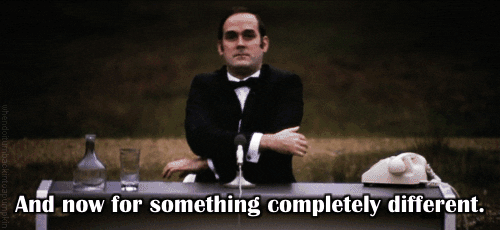I recently finished a draft of a novel. It was a meandering process, guided by occasional spurts of planning, and then re-planning around the total chaos that ensued when I actually sat down to write.
What’s more, it was based (semi-closely, in places) on true events, so I didn’t have to make everything up on my own. I also couldn’t make everything up on my own, to the extent that I felt bound to be loyal to the true events. Sometimes this took away from my ability to follow the ideals of story crafting. (Or, isn’t it pretty to think so, a nice excuse.)
Now that I’m done with that draft, I’m going to try to do another one. Different genre, not based on true events this time, no longer historical fiction. In other words:

The grand plan is to spend the next six months or so planning Book Two, and then hammering out my SFD (“shitty first draft,” for anyone who is rusty on their Anne Lamott.)
I come prepared so far with a very rough outline: as I see it now, it’s three mini-novels, unified by a common story that underlies each part. I have the loose sense of where I want each part to go, plot-wise, and the feel I want each part to have. I know, for now, where each part is set and a lot of what might happen. But what I lack right now is something tremendously fundamental to a readable novel:
Characters.
Sure, I have the vaguest sense of a few of them. One of them looks like Bebe Neuwirth in her Frasier years. I know their Enneagram types, because naturally I would. And that actually is something: it gives a framework to start building on, both with what the behaviors might be and with the directions these people might go when distressed, or when secure (about which more later.) But I don’t know much else about them, and that won’t do.
A tool that is often helpful for people in building characters is doing an exercise that I have been internally calling, grotesquely, a “character dump,” but Google is giving me no reassurance at all that this is a phrase anyone else uses. Could it be that I, on my own motion, started calling it that? Horrors. In any event, this exercise is one in which you sit down and start writing down a bunch of details about a character. When were they born? What do they like to eat? What do they wear? What was the saddest thing that happened in their childhood? What makes them laugh? Who is their best friend? What dreams do they have? Do they think a hot dog is a sandwich? And on and on.
Now, you may say, “you just said a few paragraphs up that you don’t know much about your new characters yet. How could you possibly know all these details?” Gentle reader, I don’t, and I probably won’t even after I finish this exercise. I’ll make some stuff up, like a kid half-assing an English Lit final, and maybe some of it will resonate, but most of it won’t be helpful. That’s okay. This process isn’t what you might call efficient.
Then, later, I’ll do other exercises relating to plot. They might similarly be inefficient, but then I’ll have more words down, about both these half-formed people and the half-seen things that will start happening to them. Then I’ll sit down and start writing the thing. Every 200 words or so, I’ll realize I’ve got a plot hole, or my character isn’t wanting to behave the way I expected. Fine. I’ll make new stuff up. I’ll do some tailoring at the edges of the plan. I’ll start a new plan. I’ll write more. I’ll find some massive hole. I’ll give up for a day or two, binge some romantic comedies on STARZ. I’ll come back to it and realize I have a way out that is just brilliant. I’ll write in a delighted frenzy for a week. Then I’ll realize I created an even bigger hole than before, I’ll fix it. Someday I’ll have a draft, and I’ll start over and write draft 2.
It’ll be fun.




